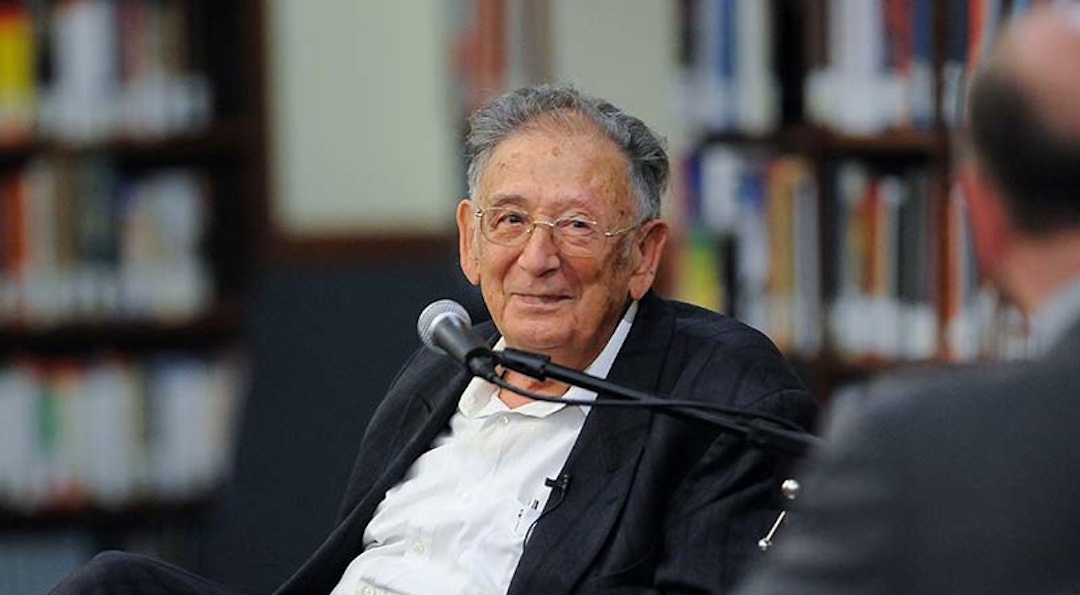IN OTHER WORDS…
Neoconspiracy Theories: The notion that neoconservatives are “Jews who serve the interests of Israel” has been embraced “with varying degrees of delicacy” by political actors ranging from Patrick Buchanan to European news outlets, writes Max Boot, a senior fellow at the Council on Foreign Relations and contributing editor to The Weekly Standard.
It is, Boot writes, a “malicious myth,” but just one of the many myths and clichés that have affixed themselves to the neoconservative movement and which Boot sets out to puncture in the January/February issue of Foreign Policy magazine. He starts off by taking aim at the notion that the “Bush administration is pursuing a neoconservative foreign policy.”
“If only it were true!” writes a wistful Boot.
He notes that those seeking to demonstrate the vast influence of the neoconservatives point to Bush administration officials such as Deputy Secretary of Defense Paul Wolfowitz, Under Secretary of Defense for Policy Douglas Feith; Vice Presidential Chief of Staff Lewis “Scooter” Libby, National Security Council staffer Elliott Abrams and Defense Policy Board member Richard Perle. Boot concedes that this list “seems impressive,” but adds that “it also reveals that the neocons have no representatives in the administration’s top tier.”
“The contention that the neocon faction gained the upper hand in the White House has a superficial plausibility because the Bush administration toppled Saddam Hussein and embraced democracy promotion in the Middle East — both policies long urged by neocons (though not only by neocons) and opposed by self-styled ‘realists’ who believe in fostering stability above all.” But, Boot is quick to add, these policies are not the result of neoconservative cajoling, but rather an outgrowth of the September 11 terrorist attacks and the consequent realization by Bush that the United States “no longer could afford a ‘humble’ foreign policy.”
Moreover, while neocons may love the aggressive National Security Strategy issued by the administration in 2002, there are plenty of areas in which Bush has spurned neoconservative ideas. “The administration so far has not adopted neocon arguments to push for regime change in North Korea and Iran. Bush has cooled on the ‘axis of evil’ talk and has launched negotiations with the regime in North Korea. The president has also established friendlier relations with Communist China than many neocons would like, and he launched a high-profile effort to promote a ‘road map’ for settling the Israeli-Palestinian conflict that most neocons (correctly) predicted would lead nowhere.”
Next, Boot tackles the notion that neocons are liberals who have been “mugged by reality,” using the definition offered long ago by the neocons’ godfather, the intellectual Irving Kristol. This definition, Boot writes, is outdated. Indeed, he notes, while some of the early neocons hailed from the left half of the political spectrum — ranging from Marxists such as Kristol to hawkish Democrats such as Jeane Kirkpatrick — many younger neocons, such as Kristol’s son William, the editor of The Weekly Standard, “have never gone through a leftist phase.”
Boot also dispatches in short order with the notion that neocons are a “well-funded and well-organized cabal.” While conceding that neocons “have some support in the media and nonprofit worlds,” he notes that the Project for the New American Century, “the leading neocon foreign policy think tank, has a staff of five,” its resources dwarfed by other Washington think tanks such as the Brookings Institution, Cato Institute and Heritage Foundation, none of which are “sympathetic to the neoconservative vision of foreign policy.”
“Sorry, conspiracy aficionados. Neocons have been relatively influential because of the strength of their arguments, not their connections,” he writes.
He also disputes the notion that neoconservatives “oppose multilateralism.” Neocons are indeed “wary of granting multilateral institutions (such as the United Nations) a veto over U.S. action, or joining deeply flawed international agreements (such as the land mine convention) simply for the sake of multilateral harmony,” he writes. Nevertheless, he argues, they are actually less unilateralist in foreign policy than traditional conservatives. Neocons “are committed above all to U.S. global leadership, and they know that the costs of such leadership (including peacekeeping and nation building) are so high that the United States needs allies to share the burden.”
Boot reserves some of his harshest ridicule for those who have accused neocons of being anti-democratic “political fundamentalists” with a “Manichean” worldview, inspired by the ideas of either the late University of Chicago classicist Leo Strauss or the Russian revolutionary Leon Trotsky. He calls this “a crude caricature,” writing that while Strauss “inspired some early neocons,” today “few read him.” He calls the notion that neocons are secret adherents to Trotsky’s ideas “even more absurd.”
There are, however, some commonly held notions about neoconservatives that, Boot concedes, have more than a grain of truth to them.
He pleads guilty to the charge that neocons are “Wilsonian idealists,” to the extent that they believe that American foreign policy should be “guided by the promotion of American ideals, not just the protection of narrowly defined strategic and economic interests.” He quickly adds, however, that neocons view the actual Woodrow Wilson, an architect of the League of Nations, as “hopelessly naive.” Unlike Wilson, Boot writes, neocons “place their faith not in pieces of paper but in power, specifically U.S. power.”
He also admits that neocons are, in fact, “targeting North Korea and Iran next.” Citing the threat posed by these two countries’ nuclear programs, he writes that neocons believe that “the only way to ensure U.S. security is to topple the tyrannical regimes in Pyongyang and Tehran,” although he cautions that this does not necessarily mean pre-emptive war.
And on one count, Boot writes, the jury is still out: namely, the question of whether postwar difficulties in Iraq have “discredited the neocons.”
He argues that in addition to the problems in Iraq, there is also “a lot of less-publicized progress,” but in any case the neocons should not be blamed for the difficulties. The problems in Iraq are due to a failure to commit sufficient resources, which Boot pins on the administration’s non-neocon secretary of defense, Donald Rumsfeld. The neocons, Boots says, had been clamoring for “more vigorous nation-building” efforts in Iraq and Afghanistan, but their cries went “largely unheeded by the administration.”.
“If neocons had been in control, they would have done far more, far earlier, in both Afghanistan and Iraq, possibly averting some of the postwar problems,” he concludes. “But fairly or not, neocons will doubtless be held responsible for the outcome in both countries; their numerous enemies, on both the left and the right, will see to that.”
A message from our CEO & publisher Rachel Fishman Feddersen

I hope you appreciated this article. Before you move on, I wanted to ask you to support the Forward’s award-winning journalism during our High Holiday Monthly Donor Drive.
If you’ve turned to the Forward in the past 12 months to better understand the world around you, we hope you will support us with a gift now. Your support has a direct impact, giving us the resources we need to report from Israel and around the U.S., across college campuses, and wherever there is news of importance to American Jews.
Make a monthly or one-time gift and support Jewish journalism throughout 5785. The first six months of your monthly gift will be matched for twice the investment in independent Jewish journalism.
— Rachel Fishman Feddersen, Publisher and CEO






















